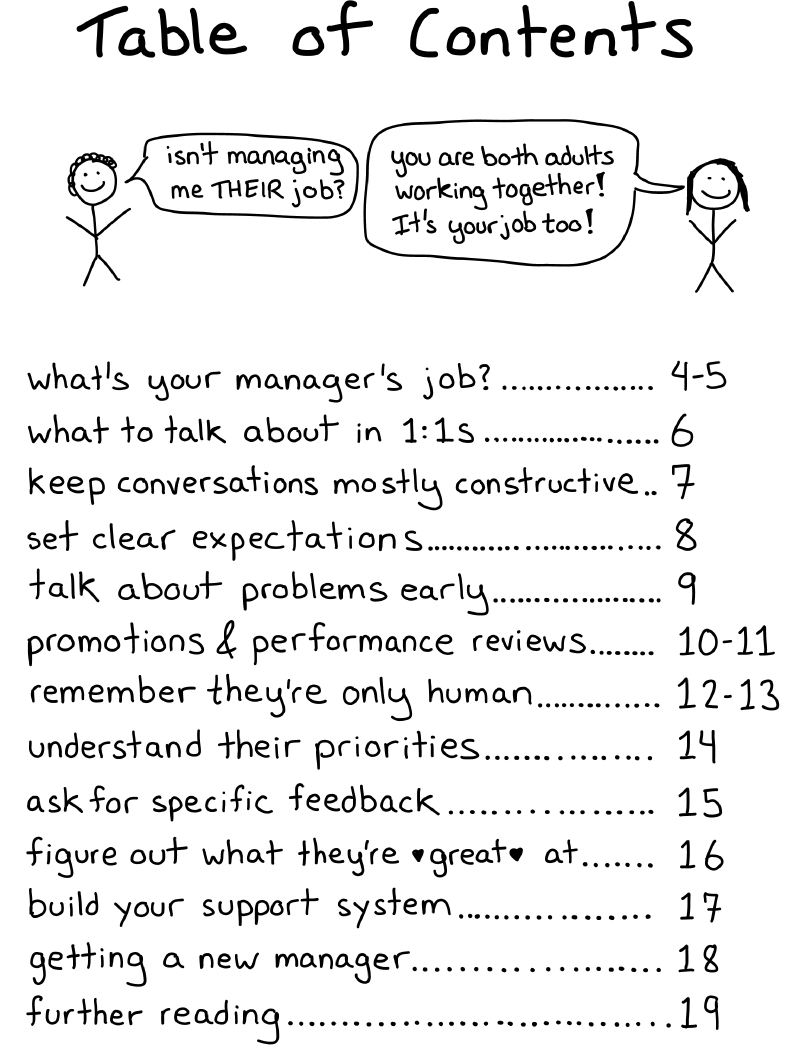How To Understand Your Manager S Job Do Awesome Work Together
On this page
- What's you manager's job
- What to talk about in 1:1s
- Keep conversations mostly constructive
- Set clear expectations
- Talk about problems early
- Work with your manager to get promoted
- On surviving performance reviews
- Remember they're only human
- On emotional labour
- Understand their goals and priorities
- Ask for specific feedback
- Figure out what they're great at
- Build the support system you need
- Getting a new manager
- Further reading
If you just communicate with managers well, then you can mostly focus on programming!!!

This zine is about:
- strategies that would help you work better with your managers
- explaining what a manager's job is
What's you manager's job
Make sure that your team is getting work done that will help the business.
- make sure the team is doing important projects
- keep projects on track
- communicate with other teams
- help team members grow
What to talk about in 1:1s
- what's been going well
- what's not going well
- align team priorities
- ask for opportunities
- career planning
- ask for feedback
- give feedback
- brainstorm
- ask for resources
Keep conversations mostly constructive
Bring up problemsthat you're interested in fixing andbring ideas for solutionswhen you can.- Venting(complain) can be useful too though sometimes! If there's a problem, it's often helpful to bring it up even if you don't have a solution.
Set clear expectations
Setting expectations is awesome because:
- you feel confident that your plans are reasonable
- your manager is aware of what you're planning and can coordinate
This is how
- come up for a plan for what to prioritize
- tell my manager the plan and ask if it sounds good
- trust them when they say yes
Talk about problems early
It's way better to bring up a problem early and figure it out before it turns into a big deal!
Work with your manager to get promoted
If this is something you care about, keep checking in periodically! The person who cares the most about your career is you.
Some ways to start conversations:
- can we walk through the expectations for the next level to make sure that I understand them?
- what areas do you think I should focus on?
- if I accomplished X Y Z, do you think that would be enough to get promoted?
On surviving performance reviews
About a month before performance review season comes around, compile a HUGE DOCUMENT with:
- every project you did in the last year
- the project's goals & results
- cool graphs/metrics that show it was a success
- what your contributions to the project were
- people you've mentored (eg an intern!)
- project plans & documentation you've written
Remember they're only human
- It's helpful for you to remember that at any given time they're probably dealing with a lot!
- Be somewhat aware of what you manager is dealing with & help out when you can.
- Here's a project I think could be a good fit for the new person.
On emotional labour
- Emotional labour is part of what managers are paid to do. But!! Managers aren't therapists
- When you're upset about something, try to be clear about
whyand ideally explain what you thinka reasonable resolutionwould be.
Understand their goals and priorities
Manager: Can you get metrics on X's speed? They might be asking for metrics because:
- they're hearing complaints about X being slow (that you might not be hearing!)
- without metrics, it's hard for them to have an informed conversation about those complaints (& defend you if X is actually fast )
Having regular conversations about their priorities for the team is SO USEFUL and means that you're surprised less often
Ask for specific feedback
Asking specific questions forces you to actually think about which areas you might want to focus on
- what do you think of this design?
- Did I prioritize these things well?
- Should I be doing more or less of X?
- Do you have any concerns about project?
- Was that email clear?
Figure out what they're great at
Different managers are good at different things!
- Product design
- Building remote teams
- Running meetings
- Helping people resolve conflicts
- Understanding the business
- Prioritizing ruthlessly
- Solving tricky technical problems
Not every manager is good at every single thing, and that's okay! Figure out what your manager is awesome at and lean on them for those things.
Also, strengths change over time! If they're not good at something today, maybe check back in a year & see if that's changed.
Build the support system you need
The flip side of "figure out what things they're great at" is that there are always going to be things your manager can't help you with. When that happens, there are a few choices:
- Get mad that they can't help
- Resign yourself to not getting help with those things
- Find help elsewhere
- figure out what you need help with before asking. Use their time well
- focus on problem solving, not venting
Getting a new manager
- write a document explaining your past work to them
- ask them about any concerns directly often they have great answers!
- pay close attention to what they do well
- tell them when they do something great
Further reading
The Manager's Path by Elided Branches A Guide for Tech Leaders Navigating Growth and Change
